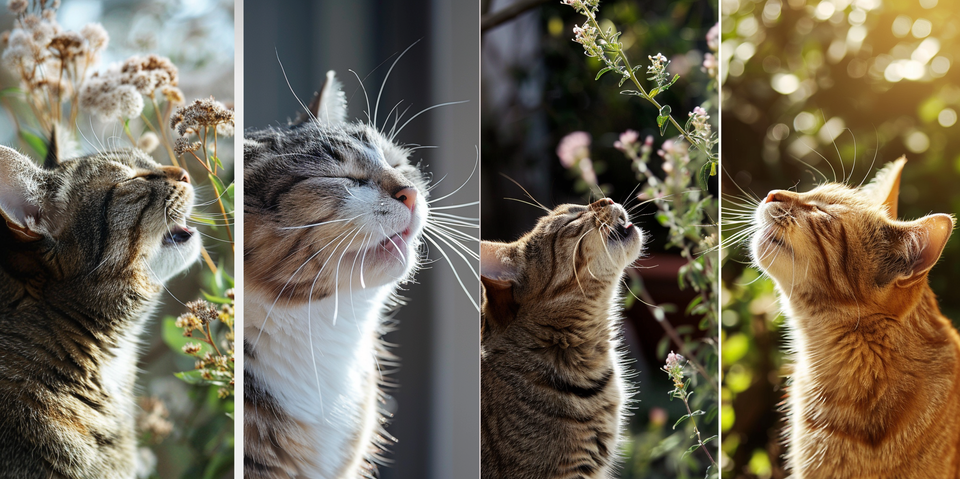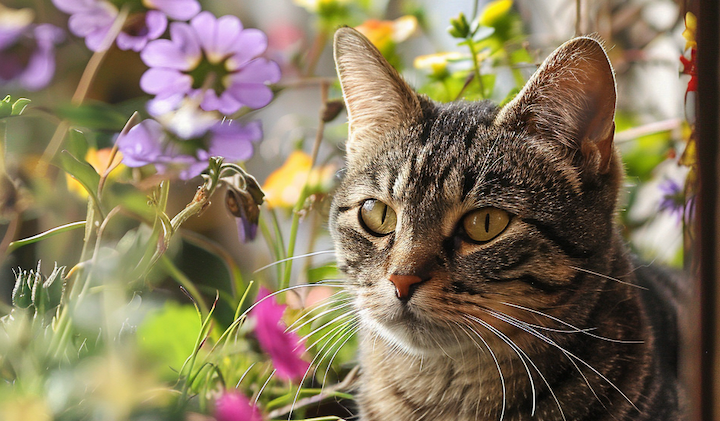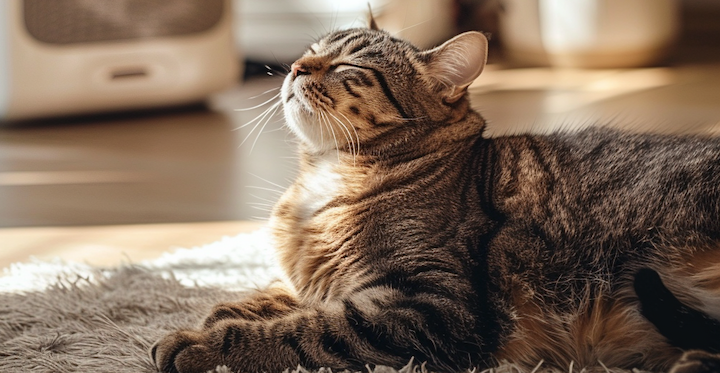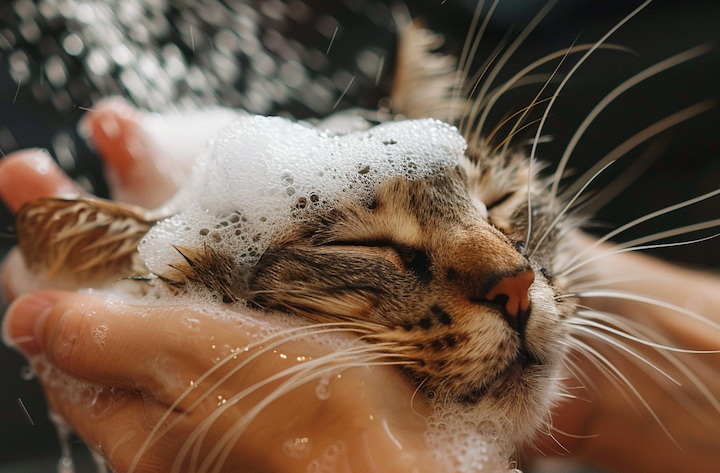Cat Allergies vs. Cold Symptoms: Telltale Signs

As a cat owner, deciphering the signs of discomfort in your feline companion can be challenging, especially when it comes to distinguishing between allergies and cold symptoms. Both conditions can exhibit similar manifestations, such as sneezing, coughing, and nasal discharge, making it crucial for pet owners to understand the nuances that set them apart. Recognizing the differences not only aids in providing the correct care and treatment but also ensures the long-term health and well-being of your cat. This introduction delves into the importance of distinguishing these conditions and will explore their common symptoms as well as the key differences. By arming yourself with this knowledge, you can take prompt and appropriate action, whether it's seeking veterinary care or adjusting your cat's environment to alleviate their discomfort. Understanding these distinctions is not just about immediate care—it's about enhancing the quality of life for your beloved feline friend.
Understanding Cat Allergies

Navigating the world of feline allergies requires a keen understanding of how various allergens impact your cat's health. Allergies in cats are not just seasonal inconveniences; they represent a significant overreaction of the immune system to seemingly harmless substances. These allergens can transform a cat's everyday environment into a source of discomfort and distress, necessitating a clear strategy for management and treatment.
Key allergens and their effects include:
- Pollen: Triggers environmental allergies akin to hay fever, leading to symptoms such as sneezing, coughing, and itchy skin.
- Dust Mites and Mold: Often cause respiratory and skin reactions, manifesting as wheezing or skin irritation.
- Certain Foods (e.g., beef, dairy, seafood): Can result in food allergies, showing as gastrointestinal upset (vomiting, diarrhea) or skin problems.
- Flea Saliva: Causes flea allergies, leading to intense itching, redness, and skin issues from just a single bite.
Each type of allergy—food, environmental, and flea—presents unique challenges and symptoms, from skin irritation and respiratory issues to gastrointestinal upset. Recognizing the signs and identifying the specific allergen type is vital for your cat's well-being.
Understanding your cat's allergies is the first step toward providing them with a happier, more comfortable life. By identifying the specific allergens that affect your cat, you can take proactive measures to avoid these triggers and seek appropriate veterinary care. This approach not only helps in managing the symptoms effectively but also ensures that your feline friend can enjoy their daily activities without the constant battle against allergies.
Understanding Cat Colds

Recognizing and addressing cat colds, or Upper Respiratory Infections (URIs), is vital for the health and comfort of our feline friends. These conditions, similar to the common cold in humans, are caused by viruses and bacteria, leading to a range of symptoms that can severely affect your cat's well-being. By understanding these signs and the nature of URIs, cat owners can take prompt action to support their pets.
Key points on cat colds include:
- Common Causes: Feline Herpesvirus (FHV) and Feline Calicivirus (FCV) are the primary viral culprits, with Bordetella and Chlamydophila representing common bacterial causes.
- Symptoms to Watch For: Sneezing, nasal congestion, runny nose, watery eyes, loss of appetite, lethargy, and fever.
- Transmission: Spreads through direct contact with infected cats or contaminated objects, such as feeding bowls and bedding.
- Treatment Essentials: No cure exists for the viral aspect, but supportive care and antibiotics for secondary bacterial infections can help manage symptoms.
Promptly recognizing the symptoms of a URI in cats and understanding their transmission can significantly impact the recovery process. Early veterinary intervention is crucial to managing the condition and preventing its spread, especially in multi-cat environments. This knowledge empowers pet owners to take necessary precautions and seek appropriate care, ensuring the health and happiness of their feline companions.
Key Differences Between Allergies and Colds
Distinguishing between allergies and colds in cats is pivotal for ensuring they receive the appropriate care and treatment. While both conditions can exhibit overlapping symptoms, there are key differences that cat owners should be aware of:
- Type of Discharge: Allergies typically cause clear, watery discharge from the eyes and nose. Colds, on the other hand, often lead to thicker, colored nasal discharge, indicating a potential infection.
- Presence of Fever: Colds in cats may be accompanied by a fever, whereas allergies do not usually cause an increase in body temperature.
- Itchiness: Allergies often cause significant itchiness, leading cats to scratch more than usual. This symptom is less common in colds.
- Sneezing and Coughing: While both conditions can cause sneezing, the persistence and context can differ. Sneezing due to allergies might be more frequent and triggered by environmental factors. Coughing is more commonly associated with colds.
- Seasonality: Allergies can be seasonal, flaring up during certain times of the year. Colds can occur any time but are often seen when there's a change in weather or exposure to other sick cats.
Understanding these distinctions is crucial for diagnosis and treatment. Recognizing the specific symptoms can guide pet owners in seeking the right veterinary advice and treatment options. For instance, allergies might be managed through environmental changes or medication, whereas colds might require a different therapeutic approach. Identifying the underlying cause accurately ensures that our feline friends receive the best possible care, promoting a quicker recovery and a healthier life.
Diagnosing Allergies and Colds in Cats

Diagnosing the root cause of your cat's symptoms—be it allergies or a cold—demands a detailed and knowledgeable approach. This distinction is critical, as it guides the subsequent treatment plan to ensure your cat's speedy recovery and long-term health. A veterinarian plays an indispensable role in this process, leveraging their expertise to determine the precise cause of your pet's discomfort.
Key steps in the diagnostic process include:
- Veterinary Examination: A comprehensive assessment covering the cat's symptoms, medical history, and possible exposure to allergens or pathogens.
- For Allergies:
- Elimination diets to identify food sensitivities.
- Skin or blood tests to detect reactions to environmental allergens.
- Monitoring the cat's response to specific treatments.
- For Colds:
- Swab tests to pinpoint viral or bacterial infections.
- Blood work to further investigate the cat's health status.
- Evaluation of the cat's reaction to supportive care measures.
The critical role of veterinary expertise cannot be overstated in distinguishing between allergies and colds in cats. An accurate diagnosis is the cornerstone of an effective treatment strategy, whether that involves long-term management for allergies or targeted medication for colds. By following a veterinarian's guidance, cat owners can ensure their pets receive the most appropriate care tailored to their specific needs, facilitating a faster recovery and helping prevent future health issues.
Treatment Options

Effective treatment of cat allergies and colds hinges on a comprehensive strategy tailored to address the specific condition your cat faces. Whether managing allergies or fighting off a cold, the goal is to relieve symptoms, prevent complications, and ensure your cat's comfort and health. Below are outlined treatment options that cater to the nuanced needs of both conditions.
For Allergies:
- Avoid exposure to identified allergens wherever possible.
- Use prescribed antihistamines or steroids to reduce inflammation.
- Consider immunotherapy for long-term allergy management.
- Implement specialized diets or supplements to address food allergies.
- Regularly bathe your cat with hypoallergenic shampoo to remove environmental allergens.
For Colds:
- Provide supportive care to maintain hydration and comfort.
- Create a warm and comfortable resting space for your cat.
- Utilize humidifiers to alleviate breathing difficulties.
- Administer antibiotics as prescribed for bacterial infections.
It's imperative for cat owners to consult with a veterinarian before administering any medications, as certain human medications can be toxic to cats. The guidance of a veterinarian is invaluable, ensuring that any treatment is safe, appropriate, and tailored to your cat's specific health requirements. This approach minimizes the risk of adverse effects and supports a swift recovery, allowing your cat to return to their normal, happy life as quickly as possible.
Final Thoughts
Understanding the distinction between allergies and colds in cats is crucial for their health and happiness. Accurate diagnosis and appropriate treatment are key, highlighting the importance of consulting with a veterinarian. Trust in their expertise to guide you, ensuring your feline friend receives the best possible care for a vibrant, healthy life.
FAQS
How can I tell if my cat has allergies or a cold?
Look for specific symptoms. Allergies often present with itchy skin, sneezing, and clear, watery discharge from the eyes and nose without fever. Colds may involve sneezing, coughing, thicker nasal discharge, possibly colored, and may be accompanied by fever and lethargy.
Can indoor cats suffer from allergies?
Yes, indoor cats can still suffer from allergies. Common indoor allergens include dust mites, mold, certain foods, and even flea saliva from fleas that find their way indoors.
What should I do if I suspect my cat has a cold?
If you suspect your cat has a cold, especially if they are exhibiting signs of respiratory distress or not improving after a few days, it's important to consult with a veterinarian for a proper diagnosis and treatment plan.
Are there any home remedies for cat colds?
While home care can support a cat with a cold, like ensuring they stay hydrated and comfortable, there are no substitutes for veterinary advice and treatment. Never give your cat medication without consulting a vet, as many human medications are toxic to cats.
How can I prevent my cat from getting allergies or colds?
For allergies, try to identify and minimize exposure to the allergens. Regular cleaning can help reduce dust and dander. For colds, maintain a clean environment and avoid contact with sick cats. Keeping your cat indoors can also reduce exposure to some common allergens and infectious agents.
Is it necessary to see a vet for a cat's cold?
Yes, it's advisable to consult a veterinarian if you suspect your cat has a cold, particularly if symptoms worsen or do not improve within a few days. This ensures that your cat receives appropriate care and any secondary infections are treated.
Can a cat's cold be transmitted to humans or other pets?
The viruses that cause colds in cats are typically species-specific and not transmissible to humans. However, they can be contagious among cats, so it's important to isolate a sick cat in a multi-pet household and follow good hygiene practices.
How long do cat colds usually last?
The duration of a cold in cats can vary, but most cats start to show improvement within 7-10 days. If your cat's symptoms persist beyond this period or worsen, it's important to consult your veterinarian for further advice.
Can diet affect a cat's allergies?
Yes, diet can significantly affect a cat's allergies, especially if they have food allergies. Identifying and eliminating the allergenic food from their diet can help reduce or eliminate symptoms. Your vet may recommend a special diet or hypoallergenic food to help manage these allergies.